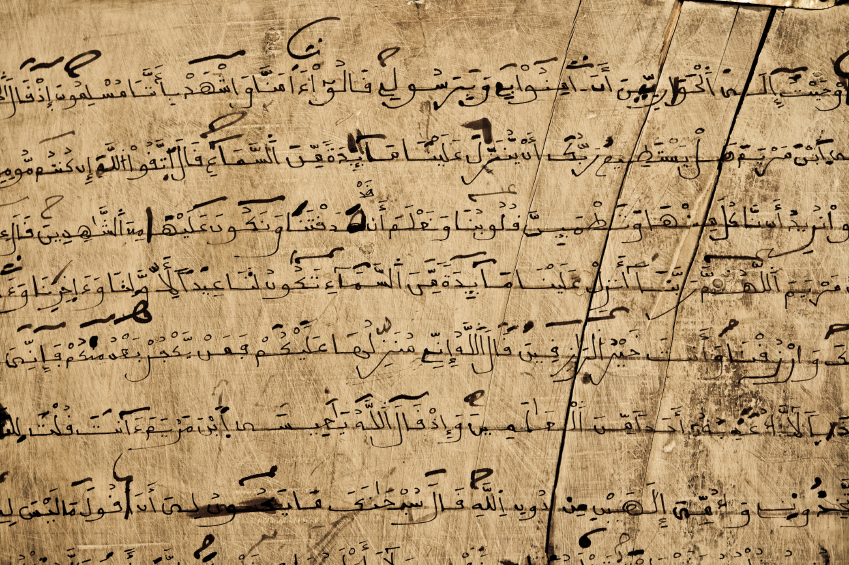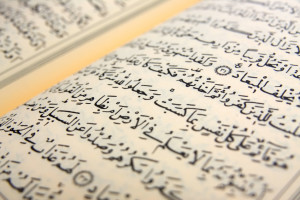
السلام عليكم و رحمة الله و بركاته,
We’ve learned about the 4 possible grammatical states of words, and the default indicators for those states. Last time, in Going high with رفع, Part 1: ضمة , we started looking at raf’ and the four situations where we will see it shown using its default indicator, the ضمة (dhammah).
Note: When we say something is the “default”, your ears (or eyes) should perk up, because that is a very subtle way of saying that there are exceptions! Arabic teachers love to do that on you. They give you a rule, then quietly break out some exceptions that just shatter your world to pieces. The only consolation you might get while you’re having your breakdown is, “Well, I said ‘most of the time’, didn’t I?”. Well, I learned it’s not their fault, because the only practical way to teach this stuff is to start from a default base rule and then mention the exceptions as they come. How did I come to know this? Because now I’m explaining it and am about to drop an exception on you (sorry!). Just don’t say I didn’t tell you 🙂
Now, going back to our main point, sometimes dhammah is not the sign that shows that a word is in raf’. Instead, we’ll see something that substitutes for it. Today’s post is on one of those substitutes, the letter و.
The substitution of و for ضمة
وَأَمَّا الوَاوُ فَتَكُوْنُ عَلامَةً لِلرَّفْعِ فِي مَوْضِعَيْنِ: فِيْ جَمْعِ المُذَكَّرِ السَّالِمِ, وَفِي الأسْماءِ الخَمْسَةِ: أبُوْكَ وَأخُوْكَ وَحَمُوْكَ وَفُوْكَ وَذُوْ مالٍ
As for the و, it is the sign of raf’ in two situations: the sound masculine plural and the “five nouns”, and they are أبُوك (your father), أخُوك (your brother), حَمُوك (your in-law), فُوك (your mouth), and ذُو مال (owner of wealth).
The و is a sign of raf’ in two situations:
- The sound masculine plural
- The “five nouns”
The sound masculine plural (جَمْعُ المُذَكَّرِ السالِمُ)
The sound masculine plural is an اسم that indicates the plural (more than 2 of the same thing) by an addition to the end of it, and it remains valid when this addition is stripped away. For example in the Quan:
- فَرِحَ المُخَلَفُوْنَ (the ones left behind rejoiced) [9:81]
- لكِن الراسِخُونَ في العلمِ مِنْهُمْ و المُؤمِنُونَ (but the ones firmly grounded in knowledge and the believers…) [4:162]
- وَ لَوْ كَرِهَ المُجْرِمُونَ (even if the criminals dislike it) [8:8]
- إنْ يَكُنَ مِنْكُمْ عِشْرُونَ صابِرُونَ (if there are from you 20 patient ones…) [8:65]
- و آخَرُونَ اعْتَرَفوا بِذُنُوْبِهِم (and others that acknowledge their faults) [9:102]
Each of the words المخلفون – الراسخون – المؤمنون – المجرمون – صابرون – آخرون is a sound masculine plural (meaning more than two), with an addition at the end (the ون).
If you take away the ون from the ending, it still remains a valid word. Taking the endings of these example words would give you
مُخلَّفٌ – راسِخٌ – مُؤمِنٌ – مُجْرِمٌ – صابِرٌ – آخَر, which are all valid.
Each of these words that occur in these verses is in the state of raf’, and what shows that is the و, instead of dhammah. The ن substitutes for the tanween in مُخَلَّفٌ and the others, just like how the و substitutes for the dhammah.
The “five nouns”
As for the “five nouns”, they are a special list of nouns and they are:
- أبُوْكَ (your father)
- أخُوْكَ (your brother)
- حَمُوْكَ (your in-law)
- فُوْكَ (your mouth)
- ذُوْ مالٍ (an owner of wealth)
- There is a sixth word, هَنُو (“thing”), but it’s so rarely used such that some don’t even consider it.
Like the sound masculine plural, they are also given raf’ using و instead of dhammah. Some examples:
- حَضَرَ أبُوكَ وَأخُوكَ وَحَمُوكَ وَنَطَقَ فُوْكَ وَذُو مالٍ (Your father, your brother and your in-law came, and your mouth and an owner of wealth spoke)
- هذا أبُوْكَ (This is your father)
- أبُوكَ رَجَلٌ صالِحٌ (“Your father is a righteous man”)
- أبُونا شَيْخٌ كَبِيْرٌ (“Our father is an old man”) [Quran 28:23]
- مِنْ حَيْثُ أمرَهُمْ أبُوهُمْ (“From where their father ordered them”) [Quran 12:68]
- وَإنَّهُ لَذُوْ عِلْمٍ (“and indeed he was a possessor of knowledge”) [Quran 12:68]
- إنِّيْ أنا أَخُوْكَ (“Indeed I am your brother”) [Quran 12:69]



